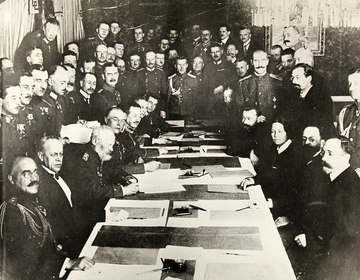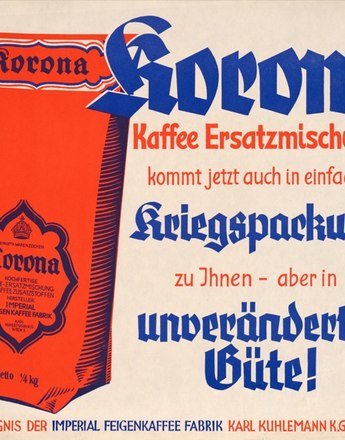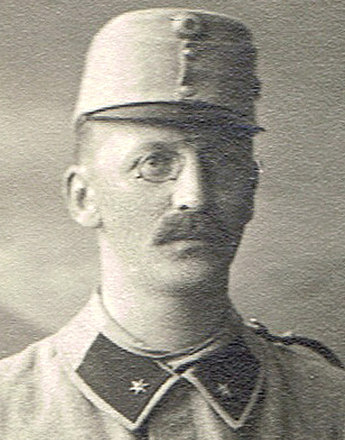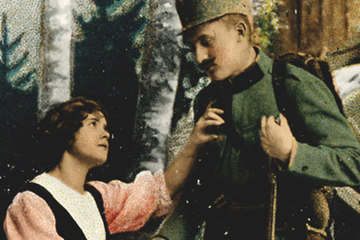‘… surely this war must end some time?!’
By the end of 1916 an increasing longing for an early peace was being voiced by the population of Austria-Hungary. With no end to the conflict in sight, the countless casualties that the war had already claimed together with the continually deteriorating supply situation and food shortages, people were simply becoming ‘war-weary’.
One of the numerous monthly reports from the postal censorship office from 1917 summarized the mood as follows: ‘[…] a waning of any interest in political and military events – with the exception of all enterprises that aim at an early peace.’
Not only public opinion, however, but also Emperor Karl, who had ascended the throne on 22 November 1916, and the newly appointed foreign minister Count Czernin, wished as well ‘to end the inherited war as soon as possible’. Karl sent a peace note to the neutral powers of the United States, Switzerland and Spain which was to be forwarded to the Entente. Count Czernin gave an interview in March 1917 ‘supporting the idea of a peace conference with all the belligerent states’ and laying out the general conditions under which Austria-Hungary would be ready to negotiate. These included a guarantee for the continued existence of the Monarchy and the demand ‘for a peace with honour on both sides’.
Public debate about peace intensified with the revolutionary events in Russia at the end of 1917. Many people in Austria-Hungary hoped that the October Revolution might lead to an early peace. Mathilde Hanzel also followed the events in Russia with keen interest. On 8 November 1917 she wrote to her husband: ‘The evening paper has just reported the news of the revolution by the workers and soldiers’ council against Kerensky’s government. If this report is true, then we may be closer, much closer, to peace […].’
The Russian Revolution and the potential end to the war that it seemed to herald are a common theme in Mathilde Hanzel’s subsequent letters from that time. On 9 November 1917 she writes: ‘[…] the main thing is that we conclude peace with the Russians, and that finally seems to be happening. – Darling, how I long for the news that the first peace negotiations are beginning […].’
It was to be another month before a ten-day truce was signed by representatives of Austria-Hungary, the German Empire and Russia on 5 December 1917. The first round of official peace negotiations followed at the end of December 1917. Eventually, on 3 March 1918, Austria-Hungary, Germany, Turkey, Bulgaria and Soviet Russia ratified a peace treaty today known as the Peace of Brest-Litowsk.
Translation: Sophie Kidd
Ehrenpreis Petronilla. Kriegs- und Friedensziele im Diskurs. Regierung und deutschsprachige Öffentlichkeit Österreich-Ungarns während des Ersten Weltkriegs, Innsbruck/Wien/Bozen 2005
Kochanek, Hildegard: Friede von Brest-Litowsk, in: Hirschfeld, Gerhard/Krumeich, Gerd/Renz, Irina (Hrsg.): Enzyklopädie des Ersten Weltkriegs, 3. Auflage, Paderborn/München/u.a. 2009, 506-508
Rebhan-Glück, Ines: „Wenn wir nur glücklich wieder beisammen wären …“ Der Krieg, der Frieden und die Liebe am Beispiel der Feldpostkorrespondenz von Mathilde und Ottokar Hanzel (1917/18), Unveröffentlichte Diplomarbeit, Wien 2010
Rauchensteiner, Manfried: Österreich-Ungarn, in: Hirschfeld, Gerhard/Krumeich, Gerd/Renz, Irina (Hrsg.): Enzyklopädie Erster Weltkrieg, 3. Auflage, München/Wien 2009, 64-86
Spann, Gustav: Zensur in Österreich während des Ersten Weltkriegs 1914-1918, Unveröffentlichte Dissertation, Universität Wien, Wien 1972
Quotes:
„surely this war must end ...“: Mathilde Hanzel to Ottokar Hanzel, 30.05.1918, Sammlung Frauennachlässe, Nachlass 1, Institut für Geschichte der Universität Wien (Translation: Sophie Kidd)
„[…] a waning of any interest ...“: monthly report, quoted from: Spann, Gustav: Zensur in Österreich während des Ersten Weltkriegs 1914-1918, Unveröffentlichte Dissertation, Universität Wien, Wien 1972, 333
„to end the inherited war ...“: quoted from: Ehrenpreis Petronilla. Kriegs- und Friedensziele im Diskurs. Regierung und deutschsprachige Öffentlichkeit Österreich-Ungarns während des Ersten Weltkriegs, Innsbruck/Wien/Bozen 2005, 189
„supporting the idea of a peace conference ...“: quoted from: Ehrenpreis Petronilla. Kriegs- und Friedensziele im Diskurs. Regierung und deutschsprachige Öffentlichkeit Österreich-Ungarns während des Ersten Weltkriegs, Innsbruck/Wien/Bozen 2005, 213
„for a peace ‘with honour’ on both sides’“: quoted from: Ehrenpreis Petronilla. Kriegs- und Friedensziele im Diskurs. Regierung und deutschsprachige Öffentlichkeit Österreich-Ungarns während des Ersten Weltkriegs, Innsbruck/Wien/Bozen 2005, 213
„The evening paper has just ...“: Mathilde Hanzel to Ottokar Hanzel, 8.11.1917, Sammlung Frauennachlässe, Nachlass 1, Institut für Geschichte der Universität Wien (Translation: Sophie Kidd)
„[…] the main thing is that we conclude …“: Mathilde Hanzel to Ottokar Hanzel, 9.11.1917, Sammlung Frauennachlässe, Nachlass 1, Institut für Geschichte der Universität Wien (Translation: Sophie Kidd)
-
Chapters
- How does a collection of letters come to be stored in an archive?
- The protagonists: Mathilde Hübner and Ottokar Hanzel
- Love, marriage, career
- The separation begins
- ‘War fever’ versus the longing for peace
- Italy’s ‘betrayal’ in 1915
- ‘… surely this war must end some time?!’
- ‘… and tomorrow we will start cheerily canvassing for peace.’
- Black marketeering, profiteering and self-subsistence
- A love affair in wartime
-
Chapters
- “Lay down your arms” – Bertha von Suttner, the most prominent Austrian peace activist
- ‘The Austrian Society of Friends of Peace’– a brief episode?
- Alfred H. Fried and the peace movement during the war – censorship and derision
- ‘The League of Austrian Women’s Associations’ and the end of peace activities
- The Hague or the “betrayal” of the warring nation
- ‘… and tomorrow we will start cheerily canvassing for peace.’
- Peace and social issues
- The idea of the ‘peace-loving woman’?
- Peace and the Church – Thou shalt not kill!
- Peace and language – peace and the Esperanto movement
- Para Pacem – an Austrian peace movement with a difference
- Individual peace initiatives – Julius Meinl and Heinrich Lammasch
- ‘… surely this war must end some time?!’



















